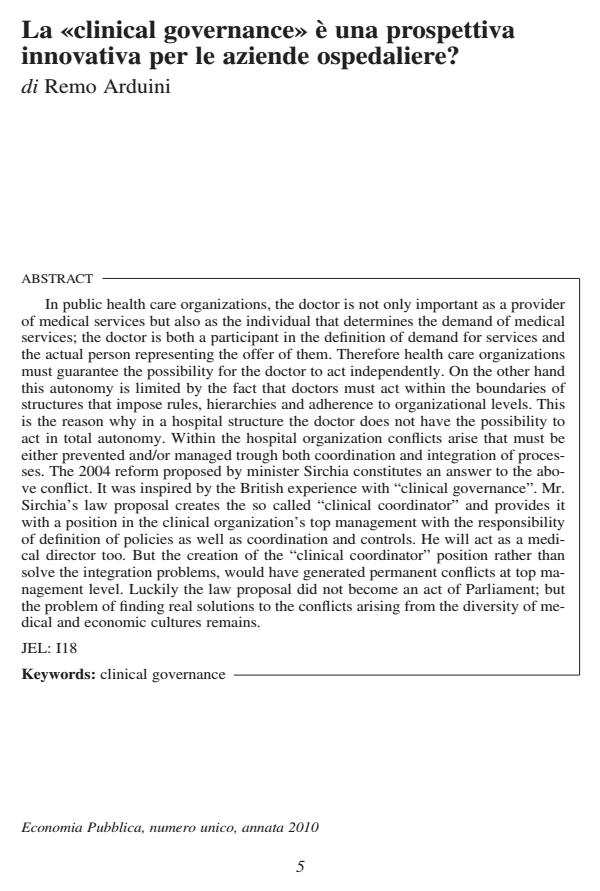La "clinical governance" è una prospettiva innovativa per le aziende ospedaliere?
Journal title ECONOMIA PUBBLICA
Author/s Remo Arduini
Publishing Year 2012 Issue 2010/1-6
Language Italian Pages 30 P. 5-34 File size 504 KB
DOI 10.3280/EP2010-001001
DOI is like a bar code for intellectual property: to have more infomation
click here
Below, you can see the article first page
If you want to buy this article in PDF format, you can do it, following the instructions to buy download credits

FrancoAngeli is member of Publishers International Linking Association, Inc (PILA), a not-for-profit association which run the CrossRef service enabling links to and from online scholarly content.
In public health care organizations, the doctor is not only important as a provider of medical services but also as the individual that determines the demand of medical services; the doctor is both a participant in the definition of demand for services and the actual person representing the offer of them. Therefore health care organizations must guarantee the possibility for the doctor to act independently. On the other hand this autonomy is limited by the fact that doctors must act within the boundaries of structures that impose rules, hierarchies and adherence to organizational levels. This is the reason why in a hospital structure the doctor does not have the possibility to act in total autonomy. Within the hospital organization conflicts arise that must be either prevented and/or managed trough both coordination and integration of processes. The 2004 reform proposed by minister Sirchia constitutes an answer to the above conflict. It was inspired by the British experience with "clinical governance". Mr. Sirchia’s law proposal creates the so called "clinical coordinator" and provides it with a position in the clinical organization’s top management with the responsibility of definition of policies as well as coordination and controls. He will act as a medical director too. But the creation of the "clinical coordinator" position rather than solve the integration problems, would have generated permanent conflicts at top management level. Luckily the law proposal did not become an act of Parliament; but the problem of finding real solutions to the conflicts arising from the diversity of medical and economic cultures remains.
Keywords: Clinical governance
Jel codes: I18
Remo Arduini, La "clinical governance" è una prospettiva innovativa per le aziende ospedaliere? in "ECONOMIA PUBBLICA " 1-6/2010, pp 5-34, DOI: 10.3280/EP2010-001001